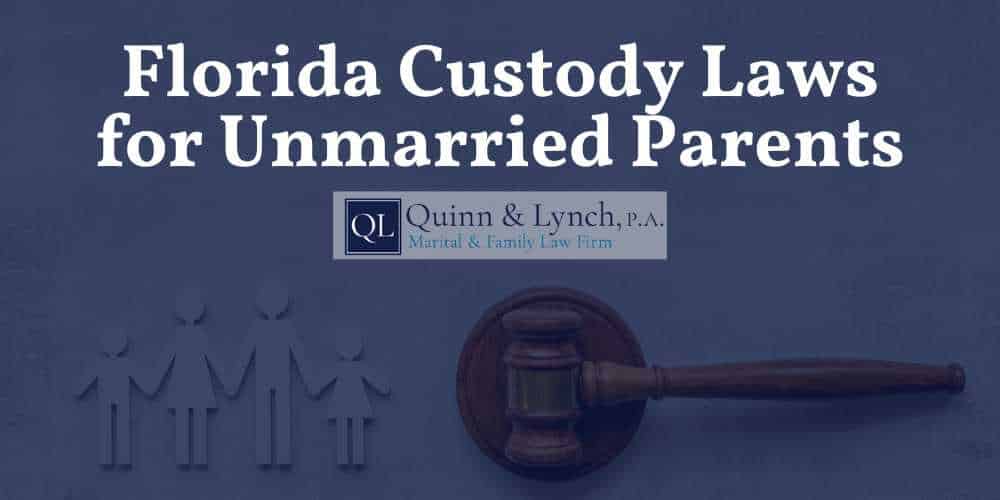Understanding Florida custody laws for unmarried parents is critical for unwed fathers and mothers navigating legal custody and physical custody issues. Whether you’re an unmarried mother or father, knowing your parental rights is essential. Under Florida law, unwed parents face unique issues when determining who has primary custody and how visitation rights will be handled. When unmarried fathers aren’t listed on birth certificates, this complicates legal custody and creates the need to establish paternity for any unwed father wanting to assert his father’s rights in Florida.
Whether you’re looking to secure parental rights, seeking joint legal custody, shared parental responsibility, or need assistance creating parenting plans, our experienced child custody attorneys in Tampa help unwed parents through Florida family courts.
Call 813-223-7739 to schedule a consultation with a Tampa family law attorney who can help protect your legal rights and child’s welfare and best interests.
Legal and Physical Custody Laws in Florida for Unmarried Parents
The Florida Department of Health says 46.1% of births in Florida in 2022 were to unwed mothers. For Hillsborough County, according to the Florida Department of Health, it’s 46.6%. Florida law regarding legal and physical custody has changed slightly as the numbers for unwed parents are almost as high as for married parents.
Under Florida Law, legal custody is gives one parent the authority to make decisions about important aspects of the child’s life, such as education, medical care, and general welfare. In contrast, physical custody under Florida law determines whether the child lives with one parent or both unwed parents.
Determining custody for unmarried couples can differ from child custody decisions for any child born to married parents, as Florida law often assumes that the natural guardian of a child born to unwed parents is the unmarried mother.
However, under a new law in 2023, unwed fathers can file a DNA test to have paternity established with Florida family courts without court proceedings. After unmarried fathers have established paternity, they have equal rights. However, one parent or both parents can petition the court for child custody arrangements. A judge must enter an order for this to be enforceable.
Once the unwed father has established paternity, courts will begin the process of determining legal custody and physical custody of the child.
When determining custody, the court considers each parent’s ability to provide for the child’s welfare. Courts may also consider the child’s preference depending on the child’s age. The court will award custody of the child to one parent or both parents, whichever is in the child’s best interests.
Understanding Florida law, especially the new law regarding child custody for unmarried parents, is essential for unwed fathers needing to secure parental rights. Whether you’re an unwed father looking to establish paternity or seeking joint custody, or an unwed mother wanting to get full custody of a child as a mother or seeking parenting plan assistance, our experienced child custody attorney team can help.
It’s important for unmarried fathers and mothers to understand their legal rights for legal and physical custody under Florida law.
A Tampa family law attorney from our law firm can help you understand time sharing in Florida, establish a parenting plan, or create a child support order that works in the best interest of your child or children.

Who Has Custody of the Child if Parents are Not Married in Florida?
Our Tampa child visitation lawyer team is often asked how custody is determined in Florida and how someone gets a child custody agreement without court in Florida.
Under Florida law, the mother is named the natural guardian for any child born to unwed parents. This means that, in Florida, unmarried mothers have both legal and physical custody of the child unless a court order states otherwise. As the natural guardian, the mother has the right to make decisions about the child’s life. Unmarried fathers, however, do not have automatic legal or physical custody.
To gain legal custody, the child’s father must first establish paternity through a legal process. Once paternity is established, the child’s father can potentially obtain custody, visitation rights, or shared parental responsibility through a court order.
The new law, called the Good Dad Act in Florida, signed in 2023, provides provisions for voluntary acknowledgment of parental responsibility for unmarried fathers. Before this new law, mothers could legally move out of state with their children, leaving unwed fathers unable to be around their children without a court-ordered legal or physical custody agreement.
The new law aims to give unmarried fathers the same legal rights and protections as unmarried mothers, recognizing unwed fathers also as natural guardians of their children.
If Both Parents are on the Birth Certificate But Not Married, Who Has Custody in Florida?
If parents aren’t married but both appear on the birth certificate, the mother typically retains automatic custody of the child unless the father establishes paternity. For unwed fathers, appearing on the birth certificate is not enough to establish legal rights for physical custody or even visitation rights. Unwed fathers must fill out paternity forms to assert parental rights. Once completed, under Florida law, the court can award custody, which can include joint custody (shared time-sharing) or sole custody, whichever is in the best interest of the child or children.
Both have the option of signing over parental rights in Florida.

Florida Custody Laws for Unmarried Parents Moving Out of State
Under Florida family law, unmarried parents with children must follow specific steps if they want to move away from the other parent. If a parent wants to move over 50 miles away, the parent must get consent from the other parent or court approval. This applies whether time-sharing or primary custody orders are in place. If both parents agree, a Tampa relocation attorney can help submit a written agreement outlining visitation rights and a new child custody schedule. Our family law attorneys recommend including transportation arrangements in parenting plan agreements.
If the other parent objects, the parent wishing to relocate can file a petition proving relocation is in the best interests of his or her child. While there are many reasons a Florida judge will deny relocation, the court carefully considers the child’s relationship with the other parent.
For those contemplating moving out of state with a child, no custody agreement, or facing relocation disputes, our Tampa family law attorneys can help protect your legal rights and ensure the best interests of the children involved are at the forefront of your case.
Unwed Mother Custody Rights in Florida
Under Florida law, unwed mothers are considered natural guardians of children at birth. This means the mother is the technical legal parent with legal rights to make all decisions regarding the child’s welfare, education, medical care, or other aspects of the minor child’s life. Unmarried mothers also have primary physical custody. Primary custody, under Florida law, means the child resides with the mother, but she also has sole parental responsibility until a parenting plan is established or a child custody agreement is ordered by a judge after paternity is established.
For unmarried mothers, child custody rights remain intact under Florida law unless a court order modifies them, typically in cases where the unwed father establishes paternity and seeks to obtain custody or shared parental responsibility.

Unmarried Fathers’ Rights in Florida
Under Florida law, unmarried fathers do not automatically have legal or physical custody rights to their children at birth. The mother is considered the legal parent and holds primary custody until the father establishes his parental rights.
When determining custody, the unwed father must establish paternity. This allows him to petition the court for visitation rights or shared parental responsibility, or for full child custody, depending on what he believes is in the best interest of his children.
Once the father has paternity established, he can seek joint custody or primary custody.
Establishing Paternity
Establishing paternity is the first step for unmarried fathers seeking child custody or visitation rights in Florida. Unmarried couples can sign a paternity form at the hospital or afterward to avoid paternity issues later.
For paternity disagreements, unwed fathers must file a paternity case with the court to have equal rights. This involves taking a DNA test to confirm the biological relationship. Once paternity is established, the father gains the legal right to petition for child custody, visitation, or shared parental rights.
Establishing paternity secures the father’s legal rights and secures the child’s right to child support, medical information, and inheritance.
Our Tampa paternity lawyers help unmarried dads understand Florida custody laws and remedy paternity issues.

Florida Child Support Laws for Unmarried Parents
Florida child support laws apply to unmarried parents the same way they do to married parents. Once a father establishes paternity, both unwed parents are obligated to support their children.
How is child support determined in Florida?
In Florida, the family law court determines child support based on the income of both parents, the child’s age and needs, as well as the parenting plan or time-sharing arrangement. For example, a judge will order higher child support payments if the child resides specifically with one parent and less in cases of joint custody child support in Florida.
Unmarried parents should understand that child support is separate from child custody or visitation rights. So, to answer questions related to signing over parental rights and child custody in Florida, a noncustodial parent must still pay court-ordered child support despite not having full physical custody. On the other hand, the primary parent can’t deny the other parent visitation based on child support arrears in Florida.
Our Tampa child support lawyers can help unwed parents navigate Florida’s child support laws and ensure that parenting plans are created with the child’s best interests in mind.
How an Experienced Child Custody Attorney in Tampa, FL, Can Help with Physical and Legal Custody Issues
Navigating physical and legal custody issues as an unmarried parent can be challenging. An experienced child custody attorney in Tampa, Florida, can ensure your child’s best interests are prioritized while protecting your parental rights.
Whether you need help establishing paternity, creating a parenting plan, or resolving child custody or child support disputes, our family law attorney group can provide experienced legal assistance. Contact our law firm today to schedule a consultation with a Tampa family law attorney.
















